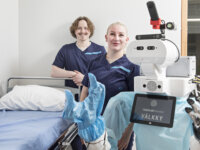Case Study
Machine Learning Model for Type 2 Diabetes Mellitus Incidence Prediction for the People Medically…
The innovation was developed because the Costa Rican Social Security Fund seeks to work with strategies that allow the social security system to be sustainable given the limitations of public health and the increase in health spending.
This is the development of a machine learning predictive model to determine the propensity to develop Type II Diabetes Mellitus in patients with EDUS.
It is innovative as it is the first predictive model based on clinical data records stored in EDUS.


